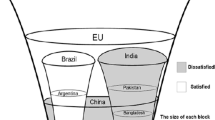Abstract
The present essay attempts to test the validity of the theory of institutional change based on the concept of property rights, in the remote historical setting of Classical Athens. The “Naval Law” introduced by Themistocles in 483-2 BC, established the institution of trierarchy to produce warships to face the Persian invaders. This reform led to the first attempt to define the costs and benefits of public goods in the field of national defense. Thus, institutional change in Ancient Athens, through an efficient arrangement of property rights and duties, had long-term consequences on economic performance, creating a new growth path and ensuring economic prosperity and social justice for more than 150 years.
Similar content being viewed by others
References
Ackroyd, P. (1992). “Greek Lessons for Property Right Arrangements: Justice and Nature Protection.” American Journal of Economics and Sociology. 51(1), 19–26.
Alchian, A. & Demsetz, H. (1973). “The Property Rights Paradigm.” Journal of Economic History. 33(1), 16–27.
Andrewes, A. (1982). “The growth of the Athenian State.” In The Cambridge Ancient History, vol. III. Cambridge University Press, 2nd revised edition.
Arthur, B.W. (1989). “Competing Technologies, Increasing Returns and Lock-in by Historical Events.” Economic Journal, 99, 116–131.
Bagnall, N. (2002). The Punic Wars, Osprey.
Burn, A. R. (1962). Persia and the Greeks, New York: Minerva Press
Carmichael, C. (1997). “Public Munificence for Private Benefit: Liturgies in Classical Athens.” Economic Inquiry. 35(2), 261–270.
Coase, R. (1992). “The Institutional Structure of Production.” American Economic Review. 82(4), 713–719.
Cohen, E. (1997). Athenian Economy and Society, Princeton University Press.
David, P. A. (1985). “Clio and the Economics of QWERTY.” AEA Papers and Proceedings. 75(2), 332–337.
David, P. A. (1994). “Why are Institutions the 'Carriers of History'? Path Dependence and the Evolution of Conventions, Organizations and Institutions.” Structural Change and Economic Dynamics. 5(2), 205–220.
Davies, J. K. (1981). Wealth and the Power of Wealth in Classical Athens, New York: Arno Press.
Davies, J. K. (1992). “Greece after the Persian Wars.” In The Cambridge Ancient History, vol. V. Cambridge University Press, 2nd revised edition.
Delbrück, H. (1990). “Warfare in Antiquity.” In History of the Art of War, vol. I, Lincoln and London: University of Nebraska Press.
Demsetz, H. (2000). “Dogs and Tails in the Economic Development Story.” In C. Menard (ed.), Institutions Contracts and Organizations, Aldershot: E. Elgar.
Finley, M. (1964). The Ancient Greeks, French translation, Paris: La Découverte, 1984.
Fogel, R.W. (1997). “Douglas North and Economic Theory.” In J. N. Drobak and J. V. C. Nye (eds.), The Frontiers of the New Institutional Economics, San Diego: Academic Press.
Fotopoulos, G. & Spence, N. (1999). “Spatial Variations in New Manufacturing Plant Openings: Some Empirical Evidence from Greece.” Regional Studies. 33, 219–229.
Gabrielsen, V. (1994). Financing the Athenian Fleet: Public Taxation and Social Relations, Baltimore: John Hopkins University Press.
Glete, J. (1993). Navies and Nations: Warships, Navies and State Building in Europe and America, 1500-1860, vol. 2, Stockholm: Corronet Books.
Glotz, G. (1953). La cité grecque, Greek Translation, Athens: MIET, 1994.
Hanson, V. D. (2002). Carnage and Culture, London: Doubleday.
Herodotus. Books 1-9, vols. I-IV. Translated by A.D. Godley, The Loeb Classical Library, London: William Heinemann Ltd.
Hodgson, G. (1999). Evolution and Institutions, Cheltenham: E. Elgar.
Hodgson, G. (2001). How Economics forgot History. The Problem of Historical Specificity in Social Sciences, London: Routledge.
Jenkins, G. K. (1959). Monnaies Grecques. Office du Livre: Fribourg, 1972.
Jones, A. H. M. (1966). Athenian Democracy, Oxford: Basil Blackwell.
Krugman, P. (1991). “History and Industry Location: The Case of the Manufacturing Belt.” American Economic Review. 81, 80–83.
Kyriazis, N. & Zouboulakis, M. (2002). “Private Law for Public Benefit: Property Rights Arrangements in Elizabethan England.” Communication at the 19th Annual Conference of the European Association of Law and Economics. Athens, Sept. 20.
Lyttkens, C. H. (1997). “A Rational Actor Perspective on the Origins of Liturgies in Ancient Greece.” Journal of Institutional and Theoretical Economics. 153(3), 462–484.
Maridakis, G. S. (1963). “La loi navale de Thémistocles.” In Studi in onore di Biondo Biondi. Milano.
Munro, J. A. R. (1977). “Marathon.” In The Cambridge Ancient History, vol. IV, Cambridge University Press.
North, D. C. (1977). “Markets and Other Allocation Systems in History: The Challenge of Karl Polanyi.” Journal of European Economic History. 6(3).
North, D. C. (1978). “Structure and Performance: The Task of Economic History.” Journal of Economic Literature. 16(3), 963–978.
North, D. C. (1981). Structure and Change in Economic History, London: W. W. Norton & Co.
North, D. C. (1984). “Transaction Costs, Institutions and Economic History.” Journal of Theoretical and Institutional Economics. 140, 7–17.
North, D. C. (1990). Institutions, Institutional Change and Economic Performance, Cambridge: Cambridge University Press.
North, D. C. (1991). “A Transaction Cost Theory of Politics.” The Journal of Theoretical Politics.
North, D. C. (1994). “Economic Performance through Time.” The American Economic Review. 84(3), 359–368.
Pejovich, S. (2002). “Understanding the Transaction Costs of Transition: It's the Culture Stupid.” Communication at the 19th Annual Conference of the European Association of Law and Economics, Athens, Sept. 20.
Pelekidés, H. (1971). “From Marathon to Thermopylae and Platea.” In History of the Greek Nation, vol. B. Athens (in Greek).
Ridgway, D. (1984). L'alba della Magna Grecia, Milano: Longanesi and Co.
Rodger, N. A. M. (1997). The Safeguard of the Sea, London: Harper & Collins.
Rodger, N. A. M. (1998). “The Military Revolution at Sea.” Unpublished manuscript.
Sakellariou, M. B. (1999). The Athenian Democracy, Heraklion: University of Crete Press (in Greek).
Samuels, Warren J. (1999). “Theories of Property.” Journal of Economic Issues. 33(1), 183–188.
Starr, C. G. (1989), The Influence of Sea Power on Ancient History, Oxford: Oxford University Press.
Tod, M. (1979). “The Economic Background of the Fifth Century.” In The Cambridge Ancient History, vol. V, pp. 1–32. Cambridge University Press, 2nd revised edition.
Toynbee, A. (1946). A Study of History, London: Dell Publishing.
Williamson, O. E. (1985). The Economic Institutions of Capitalism, NY: The Free Press.
Williamson, O. E. (1994). “Transaction Cost Economics and Organization theory.” In Smelser & Swedberg (eds.), Handbook of Economic Sociology, Princeton: Princeton U.P.
Zouboulakis, M. (2002). “Path Dependence and the Institutional Determinants of Growth.” (Forthcoming) (in Greek).
Author information
Authors and Affiliations
Rights and permissions
About this article
Cite this article
Kyriazis, N.C., Zouboulakis, M.S. Democracy, Sea Power and Institutional Change: An Economic Analysis of the Athenian Naval Law. European Journal of Law and Economics 17, 117–132 (2004). https://doi.org/10.1023/A:1026342010780
Issue Date:
DOI: https://doi.org/10.1023/A:1026342010780




